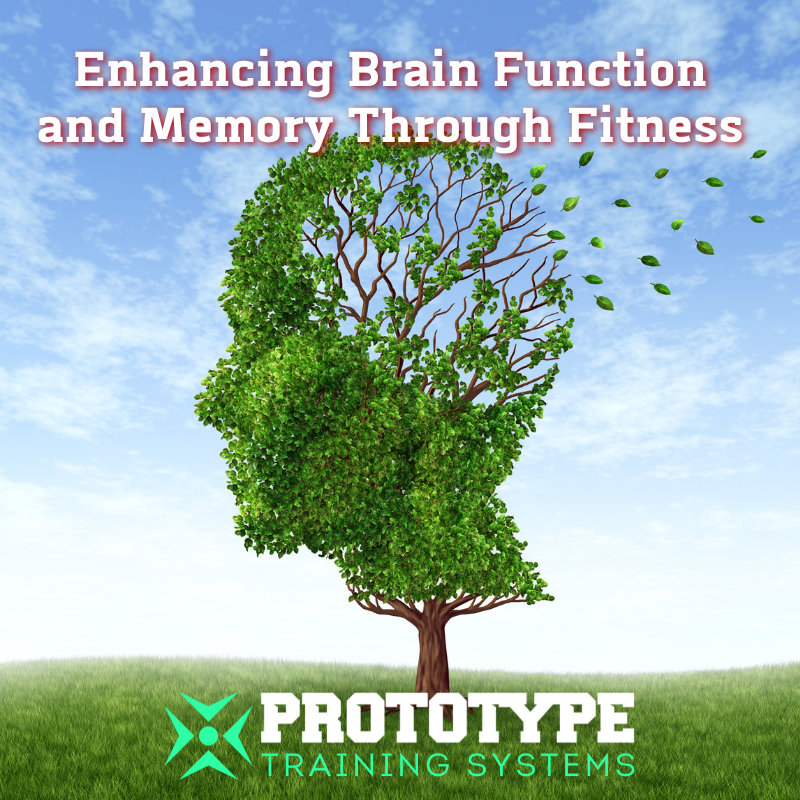Enhancing Brain Function and Memory Through Fitness

At Prototype Training Systems, we are dedicated to helping our clients achieve optimal physical and mental health. Our CrossFit and personal training facility in Westborough, MA, offers a variety of fitness programs designed to not only improve your physical strength but also enhance your brain function and memory. In this blog post, we will discuss the science behind the connection between fitness and cognitive performance, and how our unique approach to training at Prototype Training Systems can help you unlock your brain’s full potential.
Enhancing Brain Function and Memory Through Fitness at Prototype Training Systems
In recent years, scientific research has demonstrated the powerful impact of exercise on brain function and memory. One of the key components of this process is the production of a protein called brain-derived neurotrophic factor (BDNF) , which plays a vital role in the health and growth of neurons and impacts memory and learning.
- BDNF and neuroplasticity: Engaging in regular exercise at our Westborough gym, such as CrossFit or personalized training sessions, can increase the production of brain-derived neurotrophic factor (BDNF). This essential protein promotes neuroplasticity – the brain’s ability to adapt, change, and reorganize neural pathways in response to new experiences and learning.
- Improved cognitive function: Our functional training and high-intensity workouts can lead to enhanced cognitive function, including better attention, working memory, and processing speed. By increasing BDNF levels and promoting neuroplasticity, physical activity at Prototype Training Systems helps to maintain and improve the brain’s ability to process information and adapt to new challenges.
- Memory enhancement: Studies have shown that regular exercise at our CrossFit and personal training facility can lead to improved memory retention and recall. This is due, in part, to increased production of BDNF and its role in promoting the growth of new neurons, particularly in the hippocampus – a region of the brain crucial for learning and memory.
- Protection against cognitive decline: Engaging in regular physical activity at Prototype Training Systems can help protect the brain against age-related cognitive decline and neurodegenerative diseases, such as Alzheimer’s and Parkinson’s. By boosting BDNF levels and promoting neuroplasticity, exercise can strengthen the brain’s resilience and help maintain cognitive function as we age. It’s been found that DECREASED levels of BDNF are associated with neurodegenerative diseases with neuronal loss, such as Parkinson’s disease, Alzheimer’s disease, multiple sclerosis, and Huntington’s disease. Thus, BDNF may be useful in the prevention and management of several diseases including diabetes mellitus.
Incorporating Brain-Boosting Fitness Strategies at Prototype Training Systems:
- Combine aerobic and resistance training: Our diverse range of fitness programs, including CrossFit and personal training, incorporates both aerobic activities and resistance training to optimize BDNF production and promote neuroplasticity. This study shows how implementing a 3 month CrossFit training program that “the resting BDNF level increased significantly in all subjects”. You can read that study here.
- Prioritize consistency: Our flexible class schedule and personalized training options make it easy to engage in regular exercise, which is key to maintaining and enhancing brain function. If you don’t currently exercise, we recommend starting with small changes, 1-2x a week for 30-45 minutes. Ideally, ramping up to 3-5x per week at an hour of a combination of strength training and aerobic conditioning is optimal.
- Incorporate mindfulness: There are many mindfulness practices such as yoga, tai chi, and meditation. All of these can and should be integrated into your fitness routine in some capacity. While working out at Prototype Training Systems, you can combine physical activity with mindfulness and focused attention, further supporting cognitive function and neuroplasticity.
By understanding the role of BDNF and neuroplasticity in brain function and memory, we can appreciate the importance of incorporating regular physical activity into our daily lives. At Prototype Training Systems, our expert coaches, engaging programs, and supportive community in Westborough, MA, are here to help you achieve both your physical and mental fitness goals. Join us today to experience the brain-boosting benefits of fitness firsthand.
The post Enhancing Brain Function and Memory Through Fitness appeared first on Prototype Training Systems.
Previous Blogs


Climb to New Heights
Prototype Training Systems is more than a gym - it is a lifestyle. Join us today!


